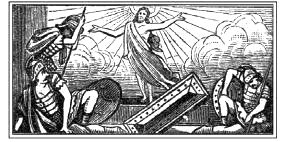
| Contents | Sancti, venite Come All Ye Holy |
AnteMissam |

This hymn is attributed to St. Sechnall (d 457), otherwise known as St. Secundius, who was the nephew of St. Patrick. A longstanding legend states that St. Patrick and his nephew St. Sechnall heard angels singing it in the church at Dunshaughlin during the offertory before communion. From that time forward it was adopted there for use during the reception of Holy Communion. The hymn can be traced back to the seventh century, which makes it perhaps the oldest known Eucharistic hymn. It appears in the Bangor Antiphoner, a seventh century Irish manuscript. The Bangor Antiphoner was written in Ireland sometime between 680 and 691. From Bangor it was carried to Bobbio, a famous monastery founded in Italy by the Irish missionary St. Columbanus. St. Columbanus was a disciple of St. Comgall, who founded the monastery at Bangor sometime around 552. St. Columbanus himself went on to found the monastery at Bobbio in 614. Exactly when the Bangor Antiphoner was carried to Bobbio is not certain. However, since it contains a list of the first fifteen abbots of Bangor, beginning with Comgall and ending with Cronanus who died in 691, it would appear that it must have been sometime afterwards. There is also some speculation that the manuscript we have today is actually a copy of the original from Bangor. The hymn itself does not appear in any ancient manuscript outside the Bangor Antiphoner. Muratori was the first to publish the text of the hymn in his Anecdota (1697-98). He first ran across the hymn in the Ambrosian Library in Milan. The Antiphoner was brought to Milan from Bobbio by Cardinal Federigo Borromeo when he founded the Ambrosian Library in 1609. As to the hymn's authorship by St. Sechnall, while the historical documentation can only be traced to the seventh century, it is quite possible that he is the author. The style of the hymn somewhat resembles that of an older style than what is usually found in a late seventh century hymn. A popular English translation "Draw Nigh and Take the Body of the Lord", which appears in many modern hymnals even today, was done by J. M. Neale (1818-1866). It first appeared in his Medieval Hymns in 1851. The one below is less well known, but perhaps a bit more literal. It was done by Fr. Adrian Fortescue (1874-1924) and appears in his book "Latin Hymns", 1913.
|
| Sancti venite, Christi corpus sumite, sanctum bibentes, quo redempti sanguinem. |
Come all ye holy, take the Body of your Lord, Drink of His chalice, take the Blood for you outpoured. |
| Salvati Christi corpore et sanguine, a quo refecti laudes dicamus Deo. |
Saved by His Body, by His sacred Blood, we raise grateful our voices unto God hymns of praise. |
| Hoc sacramento corporis et sanguinis omnes exuti ab inferni faucibus. |
By this sacrament of the Body and Blood all are delivered from the jaws of hell. |
| Dator salutis, Christus filius Dei, mundum salvavit per crucem et sanguinem. |
Giver of life, He Christ our Savior, Son of God, bought our redemption by His Cross and precious Blood. |
| Pro universis immolatus Dominus ipse sacerdos existit et hostia. |
Dying for all men, he the Lord prepared this feast, offered as a victim, offering Himself as priest. |
| Lege praeceptum immolari hostias, qua adumbrantur divina mysteria. |
God to our fathers ordered sacrifice of old; so He in symbols Christ the victim true unfold. |
| Lucis indultor et salvator omnium praeclaram sanctis largitus est gratiam. |
Giver of light, the one Redeemer of our race, He to His hold servants gives abundant grace. |
| Accedant omnes pura mente creduli, sumant aeternam salutis custodiam. |
Come, who with pure hearts in the Savior's word believe; come and partaking saving grace from Him receive. |
| Sanctorum custos, rector quoque, Dominus vitam perennem largitur credentibus. |
God our defender, guardian sure in this our strife, gives to His faithful after death eternal life. |
| Caelestem panem dat esurientibus, de fonte vivo praebet sitientibus. |
He to the hungry gives as food this heavenly bread, fountain of life, He gives to drink the blood He shed. |
| Alpha et Omega ipse Christus Dominus Venit venturus iudicare homines. |
Christ, the source of all things, who here feeds us sinful men, when this great day dawns, judge of all, will come again. |
| From "Latin Hymns", by Fr. Adrian Fortescue (1874-1924). 3rd stanza was not in "Latin Hymns" and is by MWM. |
<- Prev |
Next-> |
